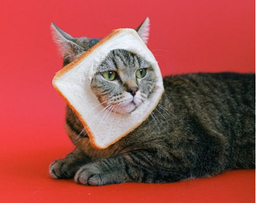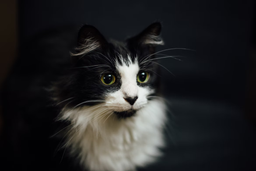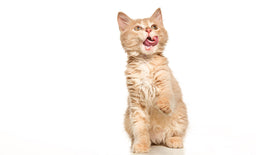Can cats eat turkey, and what does it do for them? Let’s talk turkey about feline nutrition
Turkey is the pièce de résistance of a traditional Christmas dinner and a fitting feast for our feline companions. Not only is the meat packed with essential nutrients, but it’s also leaner than pork and less caloric than beef. But can cats eat turkey every day, or should they lay off the gobbler from time to time?
Let’s look into the biological value of turkey meat and find out which cuts work best with the feline diet. We’ll also throw in a few culinary tips on how to prepare a delicious turkey dinner for your pet and skip any harmful ingredients!
Should cats eat turkey?
You can let your cat eat turkey as much as they like. Similar to chicken and duck, turkey meat contains nutrients that sustain the feline metabolism, such as:
- Animal protein
- Taurine
- Vitamin B
- Bioavailable minerals
Protein is the so-called building block of life, responsible for tissue formation, muscle growth, and healthy organ function. For felines, it’s also the primary energy source.
Since cats are carnivores, they require more protein than dogs and other omnivores. The type of protein in oats, soya beans, whole-grain, and other plants isn’t enough to cover their nutritional and energetic needs. Dark turkey meat contains 29 grams of animal protein, which is perfect for the carnivorous cat.
Animal protein enables the synthesis of amino acids, like taurine and arginine, that aren’t organically present in the cat’s body. Taurine is vital for your pet’s eye, heart, and brain function, so you must make sure they’re getting the recommended allowance from their meals. Turkey meat has a whopping 306 grams of taurine, and it can have a positive effect even when given as a treat.
The vitamins in turkey meat also play an important role in your cat’s metabolism. Vitamin B12 contributes to the feline’s immune system and digestive tract. It also assists brain function and is sometimes given as a supplement to senior cats with cognitive impairments. Vitamin B6 is beneficial to cats prone to diabetes (e.g. Maine Coons) because it regulates their glucose levels.
Turkey meat contains bioavailable minerals, mainly selenium, that help reduce shedding and hairballs!
When can kittens eat turkey?
Before they’re around three weeks old, kittens can’t eat or digest solid food. You shouldn’t give them turkey, chicken, or any other meat until they start weaning, or you risk hurting them.
At first, newborn kittens should exclusively feed on their mother’s milk. If the cat mom isn’t present, they should be placed on a diet of kitten milk replacer formula (KMR) and water. KMR is specially designed to mimic the nutritional qualities of breast milk and is enough to sustain the kitten’s growth and daily weight gain. You shouldn’t give them cow milk as a substitute since most cats are lactose intolerant.
After a few weeks of a liquid-only diet, you can slowly introduce solids. You’ll know the kitten’s ready for weaning if:
- Their eyes are fully open
- They got their first set of teeth
- They can stand on their feet without any help
During this period, you can let them try turkey and other high-protein meat. Weaning kittens can handle variety in their diet as long as they get enough of the following nutrients:
|
Nutrient |
Recommended amount |
|
Protein |
Over 50% |
|
Fat |
Up to 20% |
|
Calcium |
Around 1.5% |
Ideally, you should feed them kitten-specific formulas that contain the recommended nutrient ratio and are safe for their sensitive stomachs. The products come in the same textures and flavours as adult cat food, with turkey being one of the most common ingredients.
Besides turkey-flavoured kitten food, you can also give them turkey meat as a treat, as long as it’s thoroughly cooked and unseasoned.
Can cats eat turkey liver?

The liver is best served as a nutrient-dense snack.
Image (c) Untamed
Turkey liver is incredibly nutritious. It has 18 grams of protein and is rich in vitamin A—a micronutrient that sustains the feline’s vision, skin, and reproductive health.
Because of its high biological value, the liver is a common ingredient in commercial cat food. When cooked, turkey liver can also be a healthy treat. You must be mindful of the portions—the high allowances of vitamin A in turkey liver can lead to over-supplementation.
Too much liver in your cat’s diet can cause them to develop vitamin A toxicity over time. The symptoms include:
- Dry, rough skin
- Bone deformities
- Weight loss
- Constipation
- Lethargy
- Limited mobility
Vitamin A poisoning is brought upon by a continuously imbalanced diet or improper administration of vitamin supplements. That’s why you should always consult your vet before making significant dietary changes! Because of the delayed onset, the condition is somewhat difficult to diagnose, which is why regular check-ups are so important.
As for treatment, it mostly consists of reducing the amount of the micronutrient in the cat’s diet. Your vet will advise you to remove any food that’s rich in vitamin A (e.g. turkey liver, beef liver, sweet potatoes, pumpkins, etc.) until your cat has fully recovered.
Can cats eat turkey slices, aka deli meat?
Cats can eat turkey slices, although in moderation. Processed meat, in general, should be served as a rare treat since it contains artificial ingredients that are harmful in the long run.
The amount of sodium nitrate and other additives in deli meat (especially bacon and salami) can affect the feline’s vital organs, leading to several health issues. Studies have shown that regular intake of processed meat increases the risk of cancer.
It’s best to remove high-sodium deli meat from your cat’s diet if they have:
- Metabolic dysfunction (e.g. hyperthyroidism or diabetes)
- Acute gastrointestinal problems (e.g. pancreatitis, IBS, etc.)
- A genetic predisposition for heart disease (e.g. Siamese or Persian cats)
- Poor weight management (e.g. British Shorthairs or Ragdolls)
If your cat’s in good shape, you can let them indulge in charcuteries from time to time. Avoid serving prepackaged products and instead go for fresh deli meat with lower sodium content, such as turkey slices, chicken breast, or lean ham.
Can cats eat turkey bones?

Hey, I have a bone to pick with you!
Source: Kim Davies
A common misconception among cat parents is that bones are the feline equivalent of a toothbrush. Not only will chewing on bones do little for your cat’s oral hygiene, but it will most likely do them harm.
As your pet bites through the bone, a tiny shard can break off and get stuck in their throat, causing them to choke. If they manage to swallow it without dry heaving, the bone can still shatter in the stomach and cause internal injuries.
A much safer way to maintain your cat’s oral hygiene is to let them eat grass or give them dry biscuits occasionally. The rough texture of kibble will remove the plaque build-up and keep their mouth clean.
As they grow older, most cats start losing their teeth, so it’s a good idea to take preemptive measures. Make sure to brush their teeth regularly and only use dental care products that are VOHCA (Veterinary Oral Health Council) approved.
Turkey-flavoured kibble or turkey-flavoured wet food—which is better for your cat?
Turkey-flavoured wet food is closer to your cat’s natural feeding pattern, providing two essential nutrients:
- Water
- Animal protein
Felines need moisture in their food to compensate for their poor drinking habits. Most cats are put off by water in a bowl and can go days without taking a sip. If your pet is chronically dehydrated, their electrolyte levels can go down, causing lethargy, skin tenting, and various health issues, like UTI (most commonly bladder stones) or kidney disease.
Wet and semi-moist cat food has a much higher moisture content (70% on average) than kibble because of the way it’s manufactured. Dry food is made through an extrusion process during which the ingredients are exposed to extreme heat, with the final product having only 10% water content.
Kibble usually contains starch and various plant-based ingredients, which serve no nutritional purpose and only add bulk to the product. High-quality wet food has a lower calorie content and is typically devoid of grain fillers, vegetable protein, or animal derivatives. That’s why it’s healthier in the long run.
Regular servings of wet food will keep your cat hydrated and well-fed. You can occasionally mix in a few grams of kibble, but moist products should be their main source of nourishment.
What makes poultry the perfect cat food?
In terms of biological value, poultry is a feline superfood. Chicken and turkey are both highly nutritious, but which healthy meat is the healthiest? Let’s break down the two birds’ nutritional stats:
- Protein—Chicken breast contains approximately 31 grams of protein per 100 grams, which is slightly higher than the 29 grams in turkey breast
- Fats and carbs—Both meat cuts are devoid of carbohydrates and have similar fat content. Chicken is slightly “fattier” but has more omega-3 and omega-6 fatty acids, which keep your cat’s fur shiny and skin healthy
- Calories—The calorie content depends on the meat cut. Chicken breast is a bit more caloric than turkey breast, whereas chicken legs are less caloric than dark turkey meat
- Micronutrients—Vitamin B is present in both chicken and turkey, with no notable differences. Turkey is richer in zinc, magnesium, and potassium but also contains more sodium. Chicken meat has more iron, calcium, and manganese
- Cholesterol—Overall, chicken has less cholesterol. Turkey has approximately 109 grams of cholesterol per serving, while chicken has 88 grams
While both types of meat are undeniably good for your cat, chicken is a tad closer to being the perfect food (it’s also more affordable than turkey, which is a bonus). Turkey can make for a healthy snack and a lovely Christmas dinner, but when it comes to day-to-day meals, chicken is the more sensible option.
Untamed offers amazing protein-packed recipes
All Untamed products are made with premium poultry cuts, high-quality chicken liver, and lean, hormone-free ham! Even if your cat isn’t a fan of wet food, they’ll be reeled in by the tantalising aroma of our feline delicacies.
You can create a custom menu for your pet by taking our super-short online quiz and signing up for a trial pack. Choose from our many chicken specials and create your dream combo:
- Chocka Chicken in Jelly—Premium chicken breast dipped in mouth-watering jelly
- Chocka Chicken with Duck in Jelly—Fresh chicken breast spiced up with delicious duck meat, served in jelly
- Chocka Chicken with Ham in Gravy—Juicy chicken breast gently cooked in natural chicken gravy with a hint of ham
- Chocka Chicken in Gravy—Shredded chicken breast simmered in natural gravy

You can’t go wrong with a classic—Untamed’s Chocka Chicken in Jelly.
Image (c) Untamed
For felines who have a preference for fish, we offer a wide range of cruelty-free tuna meals, with a dash of salmon, sardine, mackerel, shrimp, and prawns. Our most popular jelly and fish recipes include:
- Tuck-in Tuna in Jelly—Dolphin-safe tuna steak in jelly and appetising fish broth
- Tuck-in Tuna with Salmon in Jelly—Tuna steak in jelly complemented with high-quality salmon fillet
- Tuck-in Tuna with Shrimp in Jelly—Cruelty-free tuna steak served in jelly with a side of shrimp
What makes Untamed different from other brands?
Untamed food is carefully manufactured to lock in the original bioavailability of the meat. Instead of using ultra-high-temperature processing, we gently steam each meal to keep the ingredients as fresh as possible.
Every Untamed meal is:
- Full of protein—The protein content in a single serving of Untamed food is twice the industry standard. We don’t use sugar, grain filers, meat derivatives, or vegetable protein to add bulk
- Made with whole meat—We use whole meat in our recipes, making sure each cut is of human-grade quality. Besides being delicious, each meal is naturally high in taurine and other essential nutrients
- Vet-formulated—Untamed recipes are vet-formulated to meet your cat’s unique biological needs. Besides being super nutritious, each meal is free of all known allergens and perfect for the more sensitive cat
- Ethically produced—We only use ethically reared ingredients in our meals, and all our packaging is 100% recyclable. Untamed is a Carbon Neutral Certified business with a passion for creating a better world for cats and humans
- Impossible to resist—Say goodbye to fussiness! We are confident our feline cordon bleu cuisine can turn the table on picky eaters and have them meowing for seconds
Join our clowder and witness the Untamed effect!
Your feline can join our clowder of merry cats and kittens today! Order a tester pack at a competitive price and treat your furry friend to our delicious meals. All you have to do is complete these easy steps:
- Visit our Try Now page
- Tell us about your cat (life stage, food preferences, diagnosed allergies)
- Confirm your order if you like the suggested meal plan
We'll deliver your tailor-made cat food box within 24 hours, with no additional shipping fees! Once the trial period is over (i.e. after your cat happily devours the tester pack), you'll start getting monthly supplies of Untamed products.
You can make adjustments to your initial order along the way. Let us know if you’d like to change, cancel, or postpone your monthly cat food delivery, and we’ll take care of it in no time!

Is it dinner time yet?
Image (c) Untamed
Many satisfied clients have reported improvements in their cats’ health after only a few deliveries. Based on our customers’ feedback, here’s what your feline should experience after switching to Untamed:
|
Timeline |
Health benefits |
|
Within a week |
|
|
After two months |
|
|
Within four months |
|
|
Life-long benefits |
|
Quit cold turkey—is raw meat safe for cats?
While it’s true that wild cats thrive on an entirely raw diet, the same can’t be said about their indoor cousins. Raw food is often contaminated with microbial pathogens that cause disease and even death in felines.
Uncooked meat, including turkey and chicken, could contain harmful bacteria that cause fever, vomiting, diarrhoea, and lethargy, among other ailments. The contaminated feline can also be asymptomatic for weeks while spreading the infection to the rest of the family.
In some cases, the disease can result in death. Namely, pregnant queens, kittens, and elderly felines are more at risk than healthy adult cats.
Besides raw meat, foodborne bacteria and parasites can be found in unpasteurised milk, uncooked eggs, or even fruit and veggies. Common pests, such as mice and slugs, also carry pathogens, so be vigilant if you let your cat roam outside.
Besides raw meat, what other foods are dangerous to cats?
The following food items don’t carry pathogens but contain other harmful substances that could jeopardise your cat’s health:
- Allium vegetables—Allium plants are poisonous to cats and can cause irreparable damage to their organs. Onions, garlic, shallots, and chives contain a powerful oxidant that attacks the red blood cells in the feline body. Long-term consumption can lead to anaemia and kidney failure, especially in older cats
- Citrus fruit—Citrus fruit causes immediate gastrointestinal issues in felines, such as vomiting, diarrhoea, and abdominal pain. Cats who are prone to allergies can even break out after merely touching the fruit
- Grapes and raisins—Grapes can cause acute kidney injury in cats and dogs alike. The root of the toxicosis is still unknown, and the effect isn’t limited to fresh fruit. Raisins and other grape byproducts have the same detrimental effect on felines
- Caffeine—Caffeine toxicity in cats takes a toll on their heart and nervous system. When ingested, the substance can induce seizures, restlessness, muscle tremors, irregular heartbeat, and heavy breathing. You should avoid giving your pet any caffeine-based product, including tea, coffee, or even chocolate
- Raw bread dough—The yeast in raw dough could stick to your cat’s stomach lining like glue and linger in their digestive tract for days. Besides causing mild to severe gastrointestinal problems, the substance can be life-threatening. The residue in your cat’s gut can start fermenting and eventually produce alcohol, which is highly toxic to cats. Even a tiny sip of hard liquor can put an average-sized adult cat into a coma, so be careful
How to prepare a delicious turkey dinner for your feline friend
We’re gonna need a bigger bowl!
Image (c) Untamed
If you wish to treat your cat to a delicious turkey dinner, here’s the safest way to prepare it:
- Boil some water in a pot or pan
- Remove the skin and bones from the meat
- Gently cook the turkey until the meat turns pink
- Check the meat temperature using a thermometer. If it’s at 75ºC or up, it’s safe for serving
- Cool at room temperature. Do not put the meat in the fridge
- Shred it to small pieces and serve it to your cat
It’s best to use the thighs and legs for your homemade meals since they have the highest protein content. The breast and wings are also nutritious, but they contain less taurine than dark meat.
Once the turkey is done, you can add other ingredients to the water and make a soup or a broth. You can use the remaining turkey cuts and even throw in a few high-fibre veggies, like carrots or green peas. Remember to hold out on the seasoning since spices can give your cat food poisoning, especially if they have a sensitive stomach.
Check out our other guides to what cats can or cannot eat:
|
|

![Best food for Ragdoll cats in the UK [Broken Down]](http://untamed.com/cdn/shop/articles/featured_best_food_for_ragdoll_cats_uk.jpg?v=1646818249&width=256)

